新概念英语第一册55-56
- 格式:ppt
- 大小:3.00 MB
- 文档页数:41
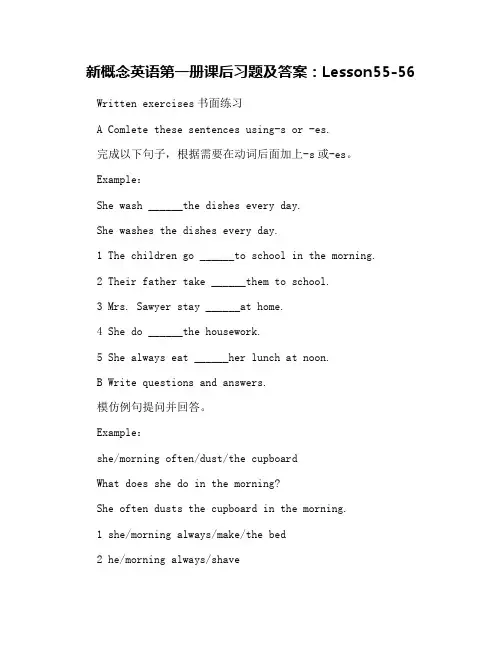
新概念英语第一册课后习题及答案:Lesson55-56 Written exercises书面练习A Comlete these sentences using-s or -es.完成以下句子,根据需要在动词后面加上-s或-es。
Example:She wash ______the dishes every day.She washes the dishes every day.1 The children go ______to school in the morning.2 Their father take ______them to school.3 Mrs. Sawyer stay ______at home.4 She do ______the housework.5 She always eat ______her lunch at noon.B Write questions and answers.模仿例句提问并回答。
Example:she/morning often/dust/the cupboardWhat does she do in the morning?She often dusts the cupboard in the morning.1 she/morning always/make/the bed2 he/morning always/shave3 they/evening sometimes/listen to/the stereo4 he/every day always/clean/the blackboard5 they/night always/go/to bed early6 she/every day usually/wash/the/dishes7 they/afternoon usually/type/some letters8 it/every day usually/drink/some milk9 they/evening sometimes/watch/television10 she/noon always/eat/her lunch11 he/evening often/read/his newspaper答案:Lesson 56A1 The children go to school in the morning.2 Their father takes them to school.3 Mrs. Sawyer stays at home.4 She does the housework.5 She always eats her lunch at noon.B1 What does she do in the morning? She always makes the bed in the morning.2 What does he do in the morning? He always shaves in the morning.3 What do they do in the evening? They sometimes listen to the stereo in the evening.4 What does he do every day? He always cleans the blackboard every day.5 What do they do at night? They always go to bed early at night.6 What does she do every day? She usually washes the dishes every day.7 What do they do in the afternoon? They usually type some letters in the afternoon.8 What does it do every day? It usually drinks some milk every day.9 What do they do in the evening? They sometimes watch television in the evening.10 What does she do at noon? She always eats her lunch at noon.11 What does he do in the evening? He often reads his newspaper in the evening.。


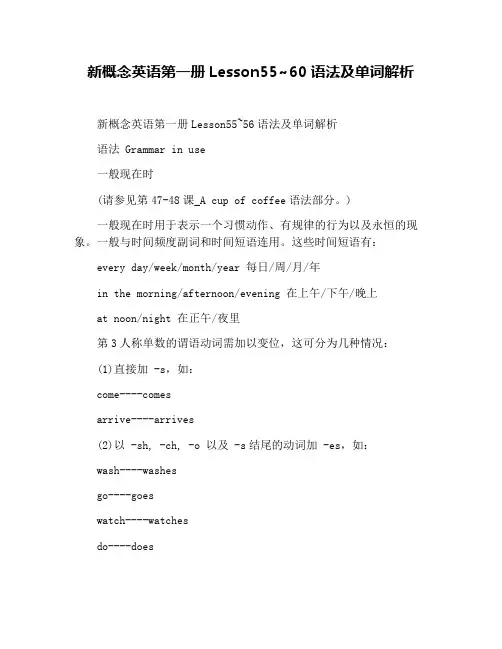
新概念英语第一册Lesson55~60语法及单词解析新概念英语第一册Lesson55~56语法及单词解析语法 Grammar in use一般现在时(请参见第47-48课_A cup of coffee语法部分。
)一般现在时用于表示一个习惯动作、有规律的行为以及永恒的现象。
一般与时间频度副词和时间短语连用。
这些时间短语有:every day/week/month/year 每日/周/月/年in the morning/afternoon/evening 在上午/下午/晚上at noon/night 在正午/夜里第3人称单数的谓语动词需加以变位,这可分为几种情况:(1)直接加 -s,如:come----comesarrive----arrives(2)以 -sh, -ch, -o 以及 -s结尾的动词加 -es,如:wash----washesgo----goeswatch----watchesdo----does(3)以辅音加 -y结尾的动词,把 -y改成 -i,再加 -es;而元音加 -y结尾的动词,只加 -s即可:hurry----hurriescarry----carriesplay----playsstay----stays词汇学习 Word study1.arrive v.(1)到达;到来:We arrived home early.我们很早就到家了。
The train is expected to arrive in London at 8. 20 p. m.火车预计在晚上8点20分抵达伦敦。
(2)(时间等)来临;(婴儿)出生:At last the day of graduation arrived.毕业的那一天终于来临。
Elizabeth's baby arrived at midnight.伊丽莎白的婴儿是在午夜时分降生的。
2.live v.(1)居住;生活:Frank lives in Paris.弗兰克居住在巴黎。
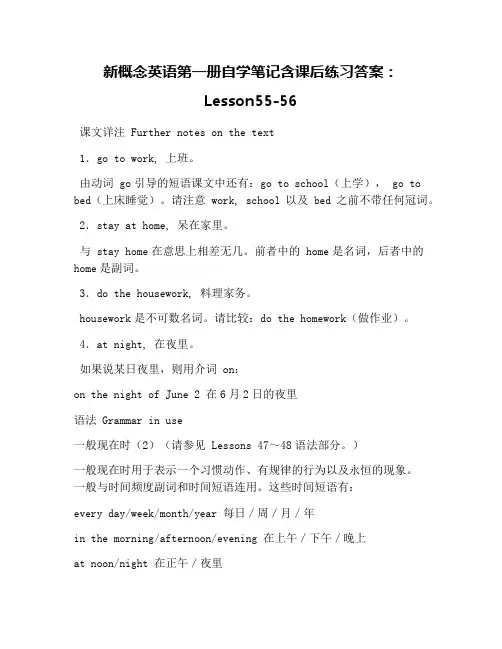
新概念英语第一册自学笔记含课后练习答案:Lesson55-56课文详注 Further notes on the text1.go to work, 上班。
由动词 go引导的短语课文中还有:go to school(上学), go to bed(上床睡觉)。
请注意 work, school以及 bed之前不带任何冠词。
2.stay at home, 呆在家里。
与 stay home在意思上相差无几。
前者中的 home是名词,后者中的home是副词。
3.do the housework, 料理家务。
housework是不可数名词。
请比较:do the homework(做作业)。
4.at night, 在夜里。
如果说某日夜里,则用介词 on:on the night of June 2 在6月2日的夜里语法 Grammar in use一般现在时(2)(请参见 Lessons 47~48语法部分。
)一般现在时用于表示一个习惯动作、有规律的行为以及永恒的现象。
一般与时间频度副词和时间短语连用。
这些时间短语有:every day/week/month/year 每日/周/月/年in the morning/afternoon/evening 在上午/下午/晚上at noon/night 在正午/夜里第3人称单数的谓语动词需加以变位,这可分为几种情况:(1)直接加 -s,如:come----comesarrive----arrives(2)以 -sh, -ch, -o 以及 -s结尾的动词加 -es,如:wash----washesgo----goeswatch----watchesdo----does(3)以辅音加 -y结尾的动词,把 -y改成 -i,再加 -es;而元音加-y结尾的动词,只加 -s即可:hurry----hurriescarry----carriesplay----playsstay----stays词汇学习 Word study1.arrive v.(1)到达;到来:We arrived home early. 我们很早就到家了。
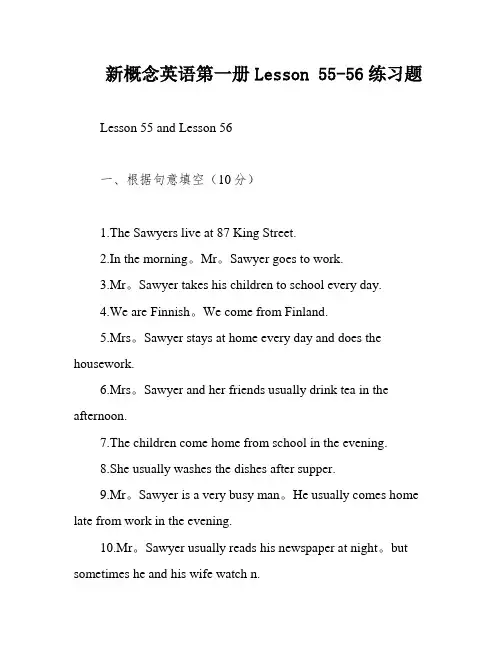
新概念英语第一册Lesson 55-56练习题Lesson 55 and Lesson 56一、根据句意填空(10分)1.The Sawyers live at 87 King Street.2.In the morning。
Mr。
Sawyer goes to work.3.Mr。
Sawyer takes his children to school every day.4.We are Finnish。
We come from Finland.5.Mrs。
Sawyer stays at home every day and does the housework.6.Mrs。
Sawyer and her friends usually drink tea in the afternoon.7.The children come home from school in the evening.8.She usually washes the dishes after supper.9.Mr。
Sawyer is a very busy man。
He usually comes home late from work in the evening.10.Mr。
Sawyer usually reads his newspaper at night。
but sometimes he and his wife watch n.二、英汉互译下列短语(10分)1.The Greens 格林一家2.go to work 上班3.stay at home 呆在家里4.at noon 中午5.see her friends 见她的朋友e home from school 放学回家e home late 晚到家8.do their homework 做他们的家庭作业9.go to bed 去睡觉10.listen to the。
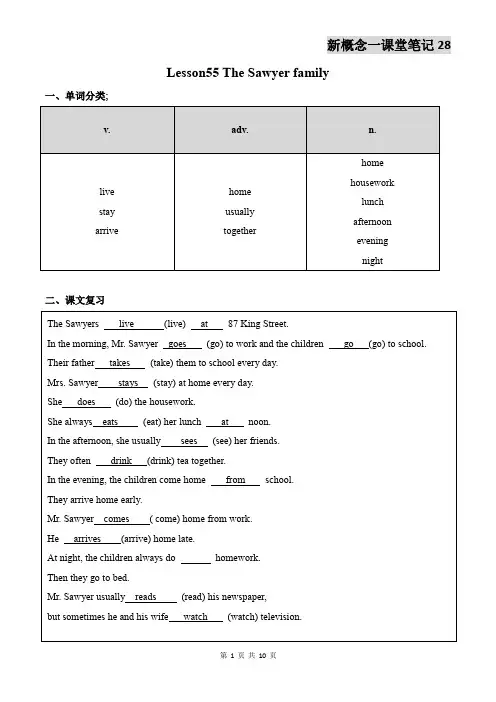
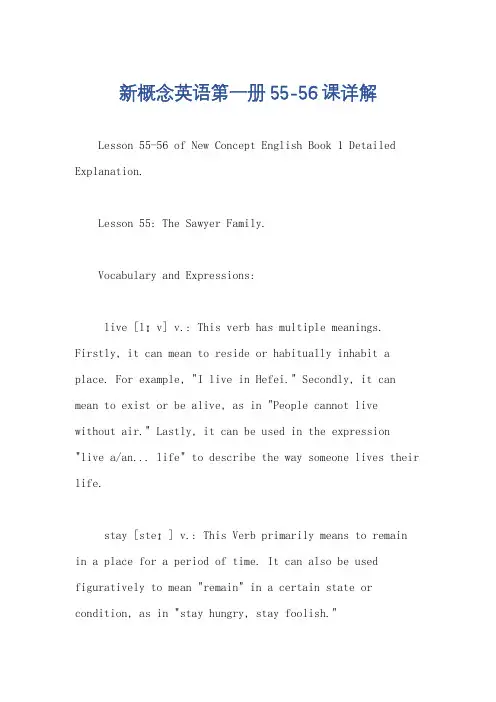
新概念英语第一册55-56课详解Lesson 55-56 of New Concept English Book 1 Detailed Explanation.Lesson 55: The Sawyer Family.Vocabulary and Expressions:live [lɪv] v.: This verb has multiple meanings. Firstly, it can mean to reside or habitually inhabit a place. For example, "I live in Hefei." Secondly, it can mean to exist or be alive, as in "People cannot live without air." Lastly, it can be used in the expression "live a/an... life" to describe the way someone lives their life.stay [steɪ] v.: This Verb primarily means to remain in a place for a period of time. It can also be used figuratively to mean "remain" in a certain state or condition, as in "stay hungry, stay foolish."home [həʊm] n./adv.: As a noun, it refers to the place where one lives. As an adverb, it means "to the place where one lives," as in "go home."housework ['haʊswɜːk] n.: This noun refers to the tasks related to maintaining a household, such as cleaning, cooking, and laundry.lunch [lʌnʃ] n.: This noun refers to the meal eaten in the middle of the day.afternoon [ɑːftə'nuːn] n.: This noun refers to the period of time between noon and evening.Text Explanation:Lesson 55 introduces the Sawyer family and their daily routine. The lesson begins by introducing the family members and their occupations. Mr. Sawyer works in an office, while Mrs. Sawyer stays at home. The children go to school. The lesson then goes on to describe their eveningactivities. Mr. Sawyer usually arrives home from work at about five o'clock, and the family then has their lunch together. In the afternoon, they often have a rest, andthen in the evening, they usually stay at home and watch television.Grammar Points:The use of "-s" or "-es" to form the third-person singular present tense of verbs is reinforced in this lesson. For example, "Mr. Sawyer usually arrives home from work at about five o'clock."The use of prepositions with "live" is also introduced. For example, "Mr. Sawyer lives in a town near London,"where "in" is used with a large place, and "Mrs. Sawyerlives at 87 King Street," where "at" is used with aspecific address.Lesson 56: What Do They Do?Vocabulary and Expressions:together [tə'geðə] adv.: This adverb means "in a group" or "side by side."evening ['iːvnɪŋ] n.: This noun refers to the time of day that comes after afternoon and before night.arrive [ə'raɪv] v.: This Verb means to reach a destination after a journey.night [naɪt] n.: This noun refers to the period of time from sunset to sunrise.Text Explanation:Lesson 56 continues the theme of the Sawyer family's daily life by asking the question, "What do they do?" The lesson provides information about the family's evening activities. Mr. Sawyer usually arrives home from work at about five o'clock, and then the family has their tea together. After tea, they usually sit in the living room and watch television. Sometimes, they go to the cinema orto the theater. On Sundays, they often go for a walk in the park.Grammar Points:The present tense of verbs is reinforced in this lesson, particularly the use of the third-person singular form.The lesson also introduces the use of modal verbs such as "can" and "usually" to express ability and frequency.Conclusion:Lessons 55 and 56 of New Concept English Book 1 focus on the Sawyer family's daily routine and activities. These lessons introduce new vocabulary and expressions related to family life, daily activities, and grammar points such as the use of "-s" or "-es" in the third-person singular present tense and the use of modal verbs. By learning these lessons, students can improve their understanding of family life in English-speaking countries and enhance theirlanguage skills in areas such as vocabulary, grammar, and comprehension.。
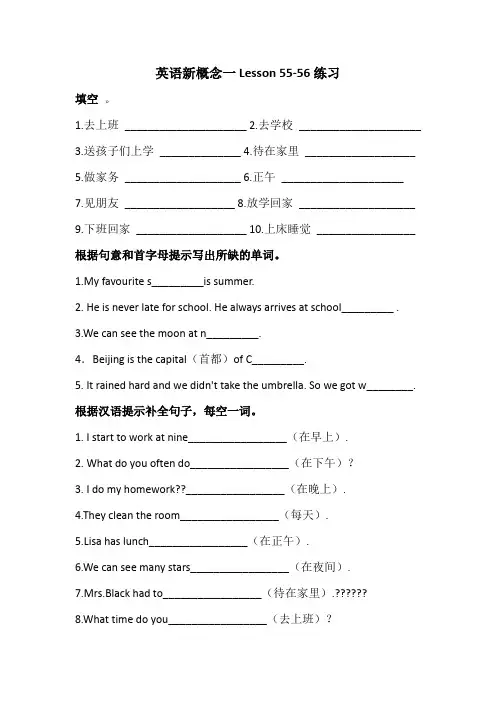
英语新概念一Lesson 55-56练习填空。
1.去上班_____________________2.去学校_____________________3.送孩子们上学______________4.待在家里___________________5.做家务____________________6.正午_____________________7.见朋友___________________8.放学回家____________________9.下班回家___________________ 10.上床睡觉_________________根据句意和首字母提示写出所缺的单词。
1.My favourite s_________is summer.2. He is never late for school. He always arrives at school_________ .3.We can see the moon at n_________.4.Beijing is the capital(首都)of C_________.5. It rained hard and we didn't take the umbrella. So we got w________.根据汉语提示补全句子,每空一词。
1. I start to work at nine_________________(在早上).2. What do you often do_________________(在下午)?3. I do my homework??_________________(在晚上).4.They clean the room_________________(每天).5.Lisa has lunch_________________(在正午).6.We can see many stars_________________(在夜间).7.Mrs.Black had to_________________(待在家里).8.What time do you_________________(去上班)?9. I often take the bus to_________________(去上学).10.You must_________________(上床睡觉)early.单选。
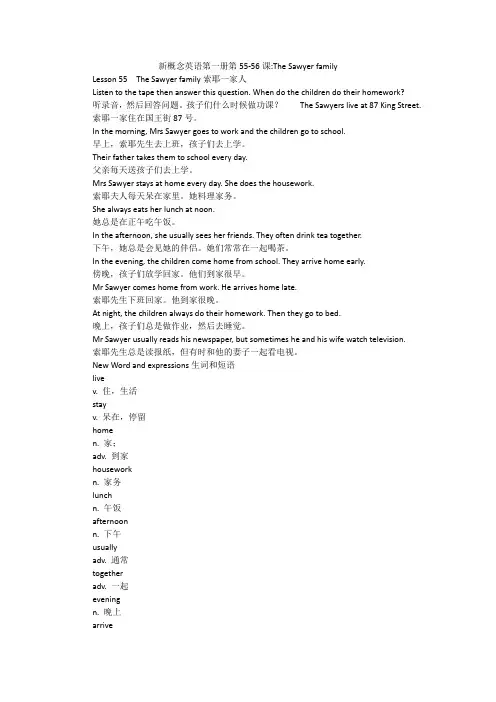
新概念英语第一册第55-56课:The Sawyer familyLesson 55 The Sawyer family索耶一家人Listen to the tape then answer this question. When do the children do their homework?听录音,然后回答问题。
孩子们什么时候做功课?The Sawyers live at 87 King Street.索耶一家住在国王街87号。
In the morning, Mrs Sawyer goes to work and the children go to school.早上,索耶先生去上班,孩子们去上学。
Their father takes them to school every day.父亲每天送孩子们去上学。
Mrs Sawyer stays at home every day. She does the housework.索耶夫人每天呆在家里。
她料理家务。
She always eats her lunch at noon.她总是在正午吃午饭。
In the afternoon, she usually sees her friends. They often drink tea together.下午,她总是会见她的伴侣。
她们常常在一起喝茶。
In the evening, the children come home from school. They arrive home early.傍晚,孩子们放学回家。
他们到家很早。
Mr Sawyer comes home from work. He arrives home late.索耶先生下班回家。
他到家很晚。
At night, the children always do their homework. Then they go to bed.晚上,孩子们总是做作业,然后去睡觉。
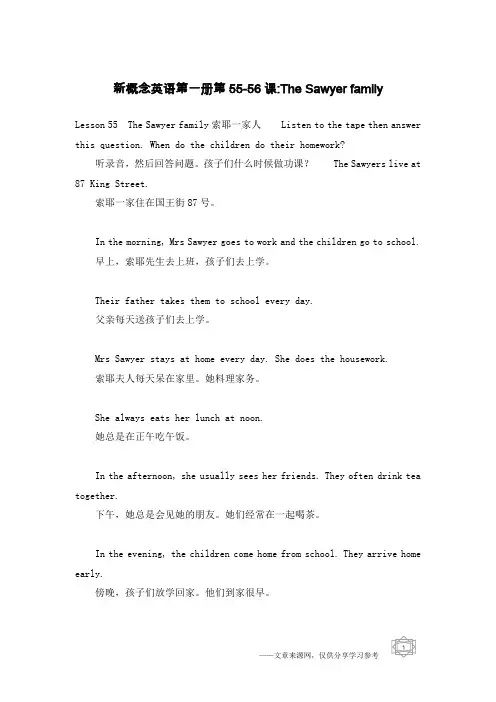
新概念英语第一册第55-56课:The Sawyer familyLesson 55 The Sawyer family索耶一家人Listen to the tape then answer this question. When do the children do their homework?听录音,然后回答问题。
孩子们什么时候做功课?The Sawyers live at 87 King Street.索耶一家住在国王街87号。
In the morning, Mrs Sawyer goes to work and the children go to school.早上,索耶先生去上班,孩子们去上学。
Their father takes them to school every day.父亲每天送孩子们去上学。
Mrs Sawyer stays at home every day. She does the housework.索耶夫人每天呆在家里。
她料理家务。
She always eats her lunch at noon.她总是在正午吃午饭。
In the afternoon, she usually sees her friends. They often drink tea together.下午,她总是会见她的朋友。
她们经常在一起喝茶。
In the evening, the children come home from school. They arrive home early.傍晚,孩子们放学回家。
他们到家很早。
Mr Sawyer comes home from work. He arrives home late.索耶先生下班回家。
他到家很晚。
At night, the children always do their homework. Then they go to bed.晚上,孩子们总是做作业,然后去睡觉。
一.根据所给中文意思补全单词。
1.l__v__ (住,生活)2.st__ __ (呆在,停留)3.h__m__ (家,在家)4.h__ __sew__ __k (家务)5.l__ __ch (午饭)6.a__t__ __n__ __n (下午)7.u__u__ll__ (通常)8.t__g__th__ __ (一起)9.ev__n__ __ __ (晚上)10.__rr__v__ (到达)11.n__ __ __t (夜间)二.用所给词的适当形式填空1. She usually __________her lunch at school. (eat)2. We ____________an English test every week. (have)3. What are you ____________tomorrow? (do)4. Look, the boy _____________on the road. (cry)5. My father _____________very hard. (work)6. Linda always ___________at home on Sundays. (stay)7. The sun _____________in the east. (rise)8. They often ___________kites in spring. (fly)9. It's six o'clock. My mother _____________. (cook)10. Mr. Sawyer sometimes _____________his newspaper at night. (read)11. The Sawyers ______ at 87 King Street. (live)12. Mr. Sawyer ______ to work in the morning. (go)13. We are from Germany, but Dimitri ______ from Greece. (come)14. The father ______ his children to school now. (take)15. Mrs. Smith ______ at home every day. (stay)16. The girl can ______ the vase on this table. (put)17. Mr. Sawyer usually ______ his newspaper at night. (read)18. We are going ______ the flowers to the teacher. (send)19. I can’t go now. I must ______ my homework. (do)20. Look, they ______ (work) hard.三.单项选择。